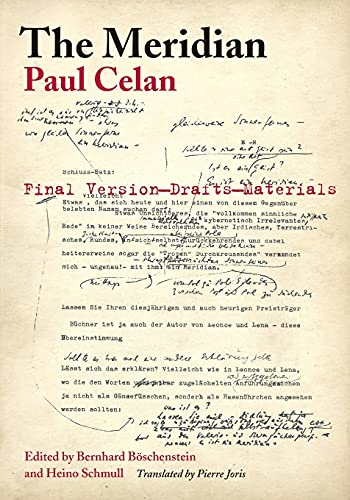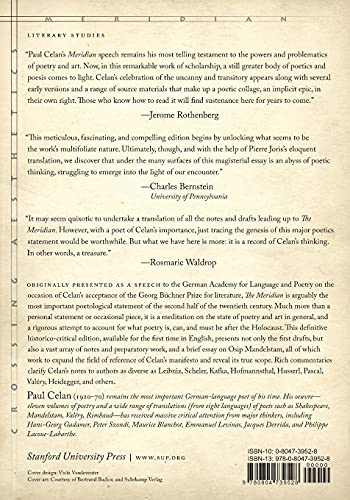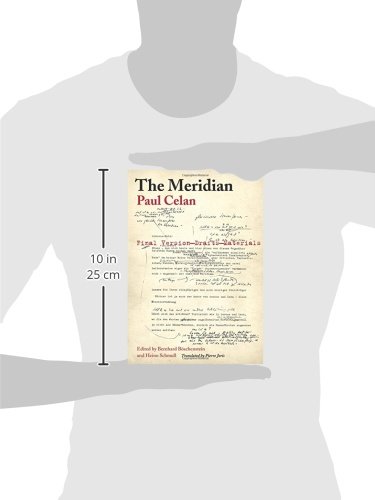Customer Services
Copyright © 2025 Desertcart Holdings Limited
Desert Online General Trading LLC
Dubai, United Arab Emirates




The Meridian: Final Version-Drafts-Materials (Meridian: Crossing Aesthetics)
T**Z
Indispensable lens into Celan's struggle with poetry
Paul Celan delivered his speech, "The Meridian," on October 22, 1960, on the occasion of receiving the Georg-Büchner Prize for Literature. To my knowledge, in addition to this volume, you can find it translated into English in the following places: by Rosemarie Waldrop in Collected Prose: Paul Celan ; by Jerry Glenn in Sovereignties in Question: The Poetics of Paul Celan (Perspectives in Continental Philosophy) ; and by John Felstiner in Selected Poems and Prose of Paul Celan . I mention all these because there are clear differences between the translators, but more importantly because each time one engages with this speech, something new arises, and so it is both beneficial and enjoyable to engage the many different English renderings. That said, for those who wish to peer even deeper into the notes and materials leading up to the final version of the speech, this edition of the "Meridian" speech is simply indispensable.The speech itself takes up the first 15 pages of this text; the remaining 200+ pages offer a lens into Celan's process of producing this poem (oops!, I mean "speech"). In his wonderful biography, Paul Celan: Poet, Survivor, Jew (Nota Bene) , John Felstiner quotes a letter of his, in which he wrote of the time he spent amassing these notes: "It was a dark summer... And the Büchner prize was, up to the last minute, an ordeal, i.e., it was both a temptation and affliction. Really. Now it's been gotten through, I even managed-- at the very last moment-- to write down a (sort of) speech" (p 163). The notes themselves attest to this ordeal in a surprisingly lucid way. Joris and the editors have done a very admirable job of retaining the many markings in the text: deleted words, dotted underscore, words or phrases added, as well as arrows, question marks, diagrammatic markings, and so on. A legend makes these many nuances easily readable. They have also corralled the many fragments into manageable topics including: Darkness, the Poem, Breath, Encounter, Hostility to Art, Time Critique, etc.-- all topics that come up, in one way or another, in the final speech. This makes it possible for both an orderly or an aleatory journey through these materials-- or both at once.We find in these notes a rich compendium of abrupt thoughts and one-word notations; quotations from Kafka, Shestov, Pascal, Adorno, Scheler, Buber, and countless others; lists of German words with their roots and associations; practical advice referencing us to Ernst Bloch or to "Read Nietzsche!"; sentences included or omitted from the final speech, all of which flash with tumutulous insight; and longer paragraphs that are often crossed-out or drastically modified with markings. Of course, there are veritable moments of poetry here as well: "And everything he blew upon was lost," "On the crest-time of the remembered pause your word finds you," "The things, that want to step into a name, step forward, come before the eyes," or "The League of Worldoutcasts: remains to be found." This is a lens into Celan's "ideas" about the poem, but more than that, it is a lens into the difficulty of such an "idea about the poem." And this struggle shows itself to be bound up with the very struggle to exist. Yet an existence for whom the reality of poetry bespoke itself of necessity.It isn't necessary to go into the ins-and-outs of these many notes, as they are an exploration and an experience unique to anyone who sets foot in this book. But it is here that we see Celan focusing in on the main themes of the "Meridian" speech, namely, that of attentiveness, of poetry as an endless vigil, and of the poem as a space of an encounter, as the crystallization of language, of language become person and person become language. To read these notes is not only to attend to the mind of a poet, but to the mind of a profound thinker: to someone for whom the question of the truth of the poem was always at stake, whether he was writing this speech, translating other poets, or writing his own poetry. Of course, one must dig into his poetry to really gather his view of poetry; in no way does this speech or these materials exhaust his struggle. But wherever one looks, what strikes and cuts the reader is the honesty Celan lends to language, poetry, and thought. It lends everything a strange, yet human light: an inimitable quality of making-ready and of extending-a-hand, gestures unique to him, but extended and present for all.I should add that, in addition to the speech and materials, the editors have included a Radio-Essay that Celan wrote titled, "The Poetry of Osip Mandelstam," which is another lens into this major influence of Celan's view of poetry. And so as to not lack in thoroughness, the editors include line by line notes to all the materials included, as well as editorial comments which briefly explain how each of the materials are situated in relation to the final speech. This amazing collection ends with an index of names and a few facsimiles of Celan's typescripts.To see the workings of this mind in such a fragmented and yet shining way is a real gift to the English reader! I extend my thanks to the editors and the translator. If you are at all interested in the nuances of this poet, who I think is unmatched in the post-WWII era, do yourself a favor and step inside this work.
F**E
... offers an opportunity to examine the process of a great poet, to drink it in
This offers an opportunity to examine the process of a great poet, to drink it in, and hopefully enrich your soul - such as it is. The struggle Celan had with the holocaust was immediate - a reality with horror, with human trauma, many of us seem buffered from today. This book is also an entre into Celan’s working method, his conversations and readings with Heidegger, Benjamin, et al. Kant’s requirement of the Sublime is extreme and Celan lives along that very border. What is going on in this kind of extreme mind - read this and discover the “least that you could do”
D**S
Difficult reading
Not as straight-forward as I thought it might have been. Not an easy read by any means. I did not find it useful at all. Just read his great poem and give it up.
Trustpilot
5 days ago
4 days ago